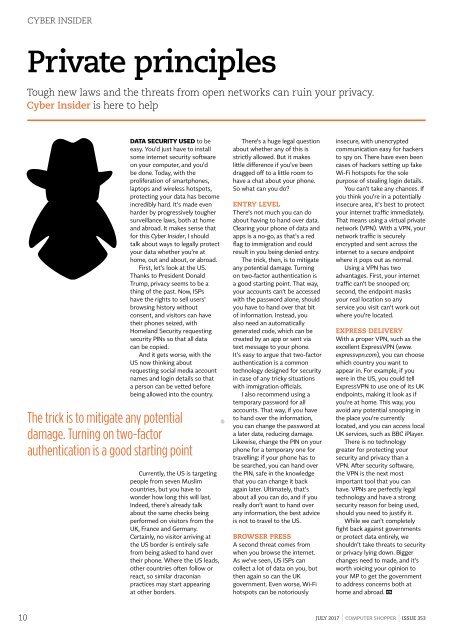Computer Shopper - July 2017
You also want an ePaper? Increase the reach of your titles
YUMPU automatically turns print PDFs into web optimized ePapers that Google loves.
CYBER INSIDER<br />
Private principles<br />
Tough new laws and the threats from open networks can ruin your privacy.<br />
Cyber Insider is here to help<br />
DATA SECURITY USED to be<br />
easy. You’d just have to install<br />
some internet security soft ware<br />
on your computer, and you’d<br />
be done. Today, with the<br />
proliferation of smartphones,<br />
laptops and wireless hotspots,<br />
protecting your data has become<br />
incredibly hard. It’s made even<br />
harder by progressively tougher<br />
surveillance laws, both at home<br />
and abroad. It makes sense that<br />
for this Cyber Insider, I should<br />
talk about ways to legally protect<br />
your data whether you’re at<br />
home, out and about, or abroad.<br />
First, let’s look at the US.<br />
Thanks to President Donald<br />
Trump, privacy seems to be a<br />
thing of the past. Now, ISPs<br />
have the rights to sell users’<br />
browsing history without<br />
consent, and visitors can have<br />
their phones seized, with<br />
Homeland Security requesting<br />
security PINs so that all data<br />
can be copied.<br />
And it gets worse, with the<br />
US now thinking about<br />
requesting social media account<br />
names and login details so that<br />
a person can be vetted before<br />
being allowed into the country.<br />
The trick is to mitigate any potential<br />
damage. Turning on two-factor<br />
authentication is a good starting point<br />
Currently, the US is targeting<br />
people from seven Muslim<br />
countries, but you have to<br />
wonder how long this will last.<br />
Indeed, there’s already talk<br />
about the same checks being<br />
performed on visitors from the<br />
UK, France and Germany.<br />
Certainly, no visitor arriving at<br />
the US border is entirely safe<br />
from being asked to hand over<br />
their phone. Where the US leads,<br />
other countries often follow or<br />
react, so similar draconian<br />
practices may start appearing<br />
at other borders.<br />
There’s a huge legal question<br />
about whether any of this is<br />
strictly allowed. But it makes<br />
little difference if you’ve been<br />
dragged off to a little room to<br />
have a chat about your phone.<br />
So what can you do?<br />
ENTRY LEVEL<br />
There’s not much you can do<br />
about having to hand over data.<br />
Clearing your phone of data and<br />
apps is a no-go, as that’s a red<br />
fl ag to immigration and could<br />
result in you being denied entry.<br />
The trick, then, is to mitigate<br />
any potential damage. Turning<br />
on two-factor authentication is<br />
a good starting point. That way,<br />
your accounts can’t be accessed<br />
with the password alone, should<br />
you have to hand over that bit<br />
of information. Instead, you<br />
also need an automatically<br />
generated code, which can be<br />
created by an app or sent via<br />
text message to your phone.<br />
It’s easy to argue that two-factor<br />
authentication is a common<br />
technology designed for security<br />
in case of any tricky situations<br />
with immigration officials.<br />
I also recommend using a<br />
temporary password for all<br />
accounts. That way, if you have<br />
to hand over the information,<br />
you can change the password at<br />
a later date, reducing damage.<br />
Likewise, change the PIN on your<br />
phone for a temporary one for<br />
travelling: if your phone has to<br />
be searched, you can hand over<br />
the PIN, safe in the knowledge<br />
that you can change it back<br />
again later. Ultimately, that’s<br />
about all you can do, and if you<br />
really don’t want to hand over<br />
any information, the best advice<br />
is not to travel to the US.<br />
BROWSER PRESS<br />
A second threat comes from<br />
when you browse the internet.<br />
As we’ve seen, US ISPs can<br />
collect a lot of data on you, but<br />
then again so can the UK<br />
government. Even worse, Wi-Fi<br />
hotspots can be notoriously<br />
insecure, with unencrypted<br />
communication easy for hackers<br />
to spy on. There have even been<br />
cases of hackers setting up fake<br />
Wi-Fi hotspots for the sole<br />
purpose of stealing login details.<br />
You can’t take any chances. If<br />
you think you’re in a potentially<br />
insecure area, it’s best to protect<br />
your internet traffic immediately.<br />
That means using a virtual private<br />
network (VPN). With a VPN, your<br />
network traffic is securely<br />
encrypted and sent across the<br />
internet to a secure endpoint<br />
where it pops out as normal.<br />
Using a VPN has two<br />
advantages. First, your internet<br />
traffic can’t be snooped on;<br />
second, the endpoint masks<br />
your real location so any<br />
service you visit can’t work out<br />
where you’re located.<br />
EXPRESS DELIVERY<br />
With a proper VPN, such as the<br />
excellent ExpressVPN (www.<br />
expressvpn.com), you can choose<br />
which country you want to<br />
appear in. For example, if you<br />
were in the US, you could tell<br />
ExpressVPN to use one of its UK<br />
endpoints, making it look as if<br />
you’re at home. This way, you<br />
avoid any potential snooping in<br />
the place you’re currently<br />
located, and you can access local<br />
UK services, such as BBC iPlayer.<br />
There is no technology<br />
greater for protecting your<br />
security and privacy than a<br />
VPN. After security soft ware,<br />
the VPN is the next most<br />
important tool that you can<br />
have. VPNs are perfectly legal<br />
technology and have a strong<br />
security reason for being used,<br />
should you need to justify it.<br />
While we can’t completely<br />
fi ght back against governments<br />
or protect data entirely, we<br />
shouldn’t take threats to security<br />
or privacy lying down. Bigger<br />
changes need to made, and it’s<br />
worth voicing your opinion to<br />
your MP to get the government<br />
to address concerns both at<br />
home and abroad.<br />
10 JULY <strong>2017</strong> | COMPUTER SHOPPER | ISSUE 353


















